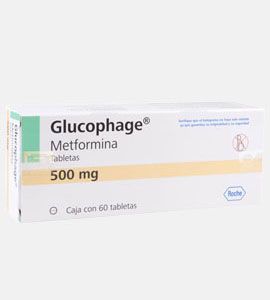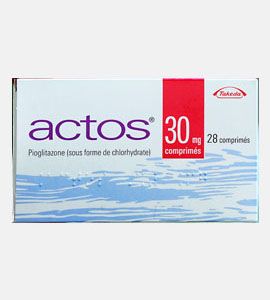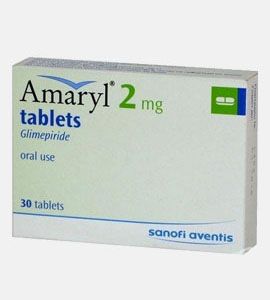Description
Common use
Glucophage is an oral diabetes medicine used to treat type 2 of diabetes. Its active substance is Metformin which belongs to the biguanide class of substances. It reduces the concentration of glucose in blood suppressing metabolism of glucose in the liver, reducing the absorption of glucose from the gastrointestinal tract, and enhancing its utilization in tissues. Glucophage stabilizes or reduces body weight. The therapeutic effect is not observed in the absence of insulin in the blood. It does not cause hypoglycemic reactions. It improves fibrinolytic properties of blood. It I used to treat diabetes mellitus (type 2) in adults also in patients for who treatment with sulfonylurea was ineffective, especially in cases followed by obesity.
Dosage and direction
Do not take if this medication was not prescribed to you and do not exceed the recommended dose. Take it with a meal if your doctor did not recommend you to take it differently. Glucophage is administered for taking twice daily by 500 mg or 850 mg once daily to treat type 2 diabetes in adults. Basing on the glucose levels in the blood the dose of Glucophage can be increased to the maximum daily dose of 2550 mg given in three divided doses.
Precautions
This medication is able to cause a life-threatening condition in some people which is characterized by weakness, increasing sleepiness, slow heartbeat, cold feeling, muscle pain, abdominal pain, shortness of breath, feeling light-headed, and fainting. It is called lactic acidosis. If you experience such symptoms get immediate medical attention. Also be attentive to symptoms of low blood sugar which include hunger, confusion, irritability, drowsiness, headache, weakness, fast heartbeat, tremors, sweating, seizure and have a source of sugar at hand always. Avoid drinking alcohol.
Contraindications
Hypersensitivity, hyperglycemic coma, ketoacidosis, kidney failure, liver disease, heart failure, acute myocardial infarction, respiratory failure, dehydration, infectious diseases, extensive surgery and trauma, alcoholism, reduced-calorie diet (less than 1000 kcal/day), lactic acidosis (including history), pregnancy, breastfeeding. The drug is not prescribed to take 2 days before surgery, radioisotope and X-ray examinations, CAT scanning (CT). Glucophage is contraindicated in patients over 60 y.o., or doing hard physical work (risk of lactic acidosis increases).
Side effects
The following side effects are most common and are rather severe to stop taking the medication:
• swelling or rapid weight gain,
• nausea,
• vomiting,
• gas,
• bloating,
• diarrhoea and loss of appetite.
In case of lactic acidosis also get emergency medical help:
• weakness,
• increasing drowsiness,
• slow heartbeat,
• cold feeling,
• shortness of breath,
• abdominal pain,
• muscle pain,
• lightheadedness, and fainting.
An allergic reaction is also possible:
• hives,
• swelling,
• rash.
Drug interaction
Cimetidine (Tagamet) increases blood levels of Glucophage affecting its metabolism. Glucophage is not compatible with alcohol. Concomitant administration with indirect anticoagulants and Cimetidine should be done with cautiousness. Glucophage enhances metabolism of Furosemide. Derivatives of sulfonylurea, insulin, acarbose, inhibitors of MAO, oxytetracycline, cyclophosphamide and salicylates increase the effects of Glucophage. Decrease of hypoglycemic effect of Glucophage is caused by co-administration with thyroid medicines, birth control pills and other hormones, Epinephrine, Glucagon, thiazide diuretics, nicotinic acid derivates.
Missed dose
If you forgot to take your dose in time, please do it as soon as you remember. But do not take if it is too late or time for your next dose is in a short while. Do not take double doses of this medication or extra doses of it. Take your usual dose next day in the same regularly time.
Overdose
Symptoms of Glucophage overdose are ones of low blood sugar: hunger, confusion, irritability, drowsiness, headache, weakness,, tremors, sweating, fast heartbeat, seizure and have a source of sugar at hand always. If you experience one of them or any unusual symptoms call your doctor immediately.
Storage
Store at room temperature between 20-25 C (68-77 F). Store away from moisture, heat, and sunlight. It is not recommended to store in a bathroom and places available for children.


